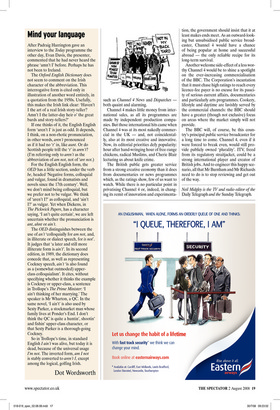Mind your language
After Padraig Harrington gave an interview to the Today programme the other day, Evan Davis, the presenter, commented that he had never heard the phrase ‘amn’t I’ before. Perhaps he has not been to Ireland.
The Oxford English Dictionary does not seem to comment on the Irish character of the abbreviation. This interrogative form is cited only in illustration of another word entirely, in a quotation from the 1950s. Usefully, this makes the Irish link clear: ‘Haven’t I the art of a real Irish story-teller? Amn’t I the latter-day heir o’ the great bards and story-tellers?’ If one thinks of it, the English English form ‘aren’t I’ is just as odd. It depends, I think, on a non-rhotic pronunciation, in other words, aren’t pronounced as if it had no ‘r’ in, like aunt. Or do Scottish people trill the ‘r’ in aren’t? (I’m referring only to aren’t as the abbreviation of am not, not of ‘are not.) For the English English form, the OED has a little section, under the verb be, headed ‘Negative forms, colloquial and vulgar, found in dramatists and novels since the 17th century’. Well, we don’t mind being colloquial, but we prefer not to be vulgar. We think of ‘aren’t I?’ as colloquial, and ‘ain’t I?’ as vulgar. Yet when Dickens, in The Pickwick Papers, has a character saying, ‘I an’t quite certain’, we are left uncertain whether the pronunciation is ant, ahnt or ain’t.
The OED distinguishes between the use of an’t ‘colloquially for am not, and, in illiterate or dialect speech, for is not’. It judges that ‘a later and still more illiterate form is ain’t’. In its second edition, in 1989, the dictionary does concede that, as well as representing Cockney speech, ain’t ‘is also found as a (somewhat outmoded) upperclass colloquialism’. It cites, without specifying whether it thinks the example is Cockney or upper-class, a sentence in Trollope’s The Prime Minister: ‘I ain’t thinking of her marrying.’ The speaker is Mr Wharton, a QC. In the same novel, ‘I ain’t’ is also used by Sexty Parker, a stockmarket man whose family lives at Ponder’s End. I don’t think the QC is quite a huntin’, shootin’ and fishin’ upper-class character, or that Sexty Parker is a thorough-going Cockney.
So in Trollope’s time, in standard English I ain’t was alive, but today it is dead, because of the universal usage I’m not. The inverted form, am I not is stably converted to aren’t I, except among the logical, golfing Irish.
Dot Wordsworth


























































 Previous page
Previous page